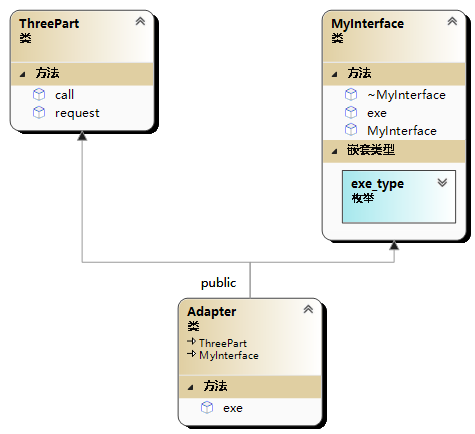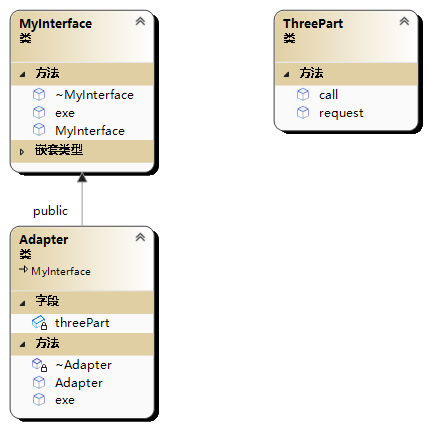
使用场景通常为,我们因为任务已经写好了接口,但是拿来了一个第三方库,接口并不相同,则在中间可以有一个适配器进行过渡,适配器可以采用继承或者组合的方式进行实现
继承方式

//适配器模式 多继承方式
#include<iostream>
using namespace std;
//原先我们的程序很久以前就在使用的接口
class MyInterface {
public:
enum exe_type{
CALL,
REQUEST
};
virtual void exe(exe_type)=0;
MyInterface() = default;
virtual ~MyInterface();
};
MyInterface::~MyInterface() {
}
//最新找来的第三方库
class ThreePart {
public:
void call();
void request();
};
void ThreePart::call() {
cout << "call" << endl;
}
void ThreePart::request() {
cout << "request" << endl;
}
//编写适配器
class Adapter:public ThreePart,public MyInterface {
public:
virtual void exe(exe_type type);
};
void Adapter::exe(exe_type type) {
switch (type)
{
case MyInterface::CALL:
call();
break;
case MyInterface::REQUEST:
request();
break;
default:
break;
}
}
int main() {
MyInterface* api = new Adapter;
api->exe(MyInterface::CALL);//call
api->exe(MyInterface::REQUEST);//request
delete api;
return 0;
}组合方式

//适配器模式 组合方式
#include<iostream>
using namespace std;
//原先我们的程序很久以前就在使用的接口
class MyInterface {
public:
enum exe_type{
CALL,
REQUEST
};
virtual void exe(exe_type)=0;
MyInterface() = default;
virtual ~MyInterface();
};
MyInterface::~MyInterface() {
}
//最新找来的第三方库
class ThreePart {
public:
void call();
void request();
};
void ThreePart::call() {
cout << "call" << endl;
}
void ThreePart::request() {
cout << "request" << endl;
}
//编写适配器
class Adapter:public MyInterface {
public:
Adapter(ThreePart *threePart);
virtual void exe(exe_type type);
private:
ThreePart* threePart;
~Adapter();
};
Adapter::Adapter(ThreePart*threePart):threePart(threePart) {
}
Adapter::~Adapter() {
delete threePart;
}
void Adapter::exe(exe_type type) {
switch (type)
{
case MyInterface::CALL:
threePart->call();
break;
case MyInterface::REQUEST:
threePart->request();
break;
default:
break;
}
}
int main() {
MyInterface* api = new Adapter(new ThreePart);
api->exe(MyInterface::CALL);//call
api->exe(MyInterface::REQUEST);//request
delete api;
return 0;
}